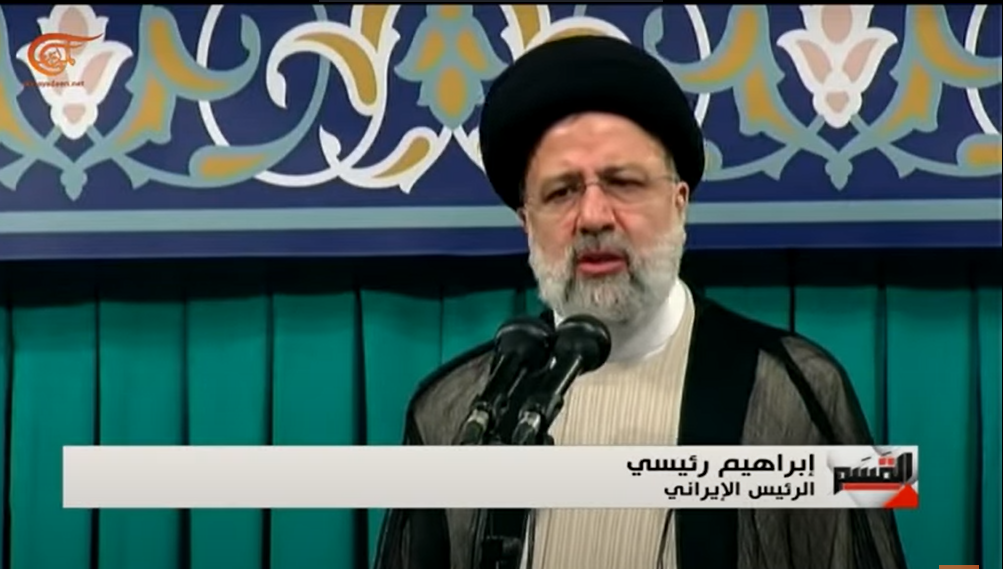Iran is strengthening and tightening its axis of resistance against Israel, after a high-profile visit by Iranian Foreign Minister Hossein Amir Abdallahian to Beirut, Lebanon, during which he met with Hezbollah Secretary General Hassan Nasrallah and with Ziyad Al-Nakhalla, the Secretary General of Islamic Jihad, and toured the border With Israel, Iranian President Ibrahim Raisi will arrive this week for a two-day visit to Syria.
Ibrahim Raisi will be the first Iranian president to visit Syria since the last visit of former Iranian President Mahmoud Ahmadinejad in September 2010.
The Lebanese newspaper Al-Akhbar, Hezbollah’s mouthpiece, reported on April 28th that the visit will be festive and will bear the “signs of victory” of the Iranian-led resistance axis against Israel, especially after the renewal of relations between Saudi Arabia and Iran and the rapprochement between Saudi Arabia and the regime of President Bashar Assad.
Sources in the know told the newspaper that the visit will be unusual in terms of its results, during the visit the Iranian president will sign several economic agreements with Syria and tour the area as well.
According to them, the issue of resistance (against Israel) will be central to the plan of the visit, which will also convey messages regarding the readiness of the axis and its vision.
Iranian President Raisi visits Syria while Israel continues to attack Iranian and Hezbollah targets in Syria in an attempt to prevent the transfer of advanced weapons from Iran to Hezbollah.
The Iranian president’s visit to Syria is seen as a defiant visit by Iran that signals to the US and Israel its determination to establish itself militarily and economically in Syria.
Through the visit, Iran is trying to convey messages to Israel and the US that a new reality has emerged in the region following the reconciliation between Iran and Saudi Arabia and the possibility of Syria’s return to the fold of the Arab League with the help of Saudi Arabia.
The Iranian president’s visit to Damascus is also intended to encourage the Arab countries to reconcile with Bashar Assad’s regime and is a kind of legitimization of Iran, which is a regional power, for the continuation of Bashar Assad’s rule.
On May 19th, the Arab Summit Conference will be held in Riyadh, Saudi Arabia, and Saudi Arabia is making efforts to convince the Arab countries to agree to Syria’s participation in the conference after it was expelled from the Arab League following President Bashar Assad’s massacres of his people. Several Arab countries are strongly opposed to the Saudi initiative to return Syria to the Arab League, including Morocco, Qatar , Kuwait, Egypt and Yemen.
Israel is worried about Iran’s intentions to unite the axis of resistance against it and to encourage Syria to play a more active role in the fight against Israel.
Security sources say that Iran is encouraged by the events that took place during the month of Ramadan in which Israel was attacked with rockets from several arenas, including the Syrian arena.
In response, Israel attacked the headquarters of Division 4 of the Syrian army, headed by General Maher Assad, the brother of President Bashar Assad, in order to convey a message to President Assad, but it seems that the message was not received and Syria continues to allow Iranian forces and Iranian militias to establish themselves in Syrian territory and also to transfer advanced weapons to Syria for Hezbollah in Lebanon.
Iran helped Syria a lot during the civil war and in fact together with Russia and Hezbollah saved the regime of President Assad from collapse, now it is collecting the price from Syria.
The Iranians are planning to turn the arena of the Syrian Golan Heights into an active front against Israel, which will allow them to tighten the stranglehold around it according to the doctrine of Qassem Soleimani.
Hamas officials say that Israel will soon be attacked with rocket fire from the Syrian Golan Heights as well, including the infiltration of Hezbollah fighters into Israeli territory.
The Iranian president’s visit to Syria is a wake-up call to Israel, which has so far refrained from attacking Syrian targets of the Bashar Assad regime, however, the moment of truth is approaching and Israel must make it clear to the Syrian president unequivocally and decisively that he will pay a heavy price for allowing Iran and its proxies to turn his country to a platform for attacks against Israel.




